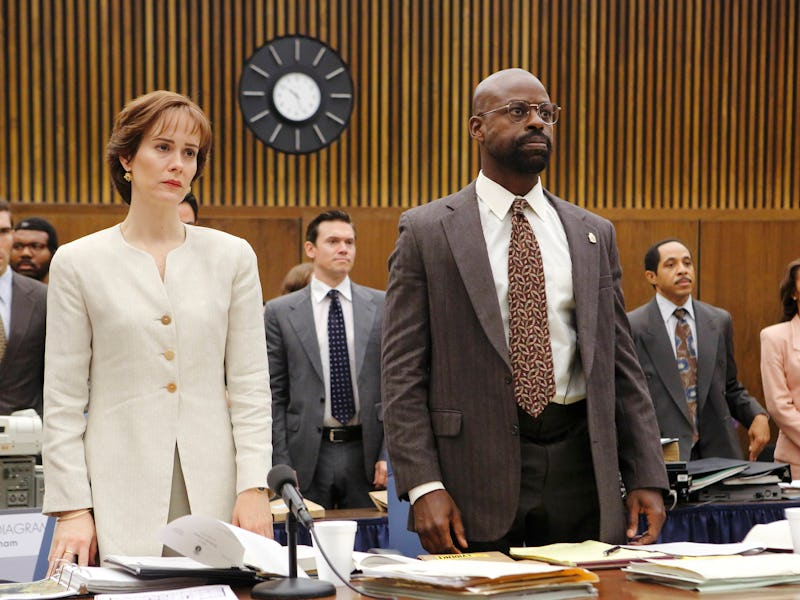Marcia Clark and Chris Darden Take a Trip in 'The People v. O.J. Simpson'
"Conspiracy Theories" pairs the prosecution up romantically. It didn't exactly happen that way.

There’s no evidence that Christopher Darden and Marcia Clark ever were romantic with another, or even that their temptation extended as far as The People v. O.J. Simpson takes it in Episode 7, “Conspiracy Theories.” Both parties have either denied it, or refused to address it. Darden’s daughter — absent except in a passing, regretful mention on the show — spoke out denying the rumors. However, Clark noted to Vulture that the show does a great job recreating the “essence” of their relationship, and Darden — in his book In Contempt — does admit that he took a San Francisco trip with Clark to unwind, something like the one imagined in American Crime Story.
The extension of the fan-fic-y flirtation in the show — to its furthest possible conclusion in Episode 7 of ACS feels a bit pulpy. But it’s a dalliance that humanizes both characters more, and their carefree trip actually forces them to confront the outrage running through the African-American community in California directly. It’s the calm before the storm — just before a few snap decisions in the courtroom create a schism between the two. Clark and Darden can better argue their case sitting around at the bar than they can in the courtroom. Clark’s haphazard shot-glass demonstration certainly beats that disastrous glove routine. Common sense doesn’t matter when you’re dealing with skilled, extroverted performers like Johnnie Cochran and O.J.
The action of the trial catches Darden and Clark in a tornado of action. They will never get reclaim the level of familiarity with each other — or for that matter, confidence about the case — that they share in that moment. The assurance they feel during that weekend turns out to be unstable and short-lived. Clark refuses to take the public cynicism on her back and ham up her points in the courtroom; Darden seems too acutely aware of it, and wishy-washy or impulsive when it comes to fighting back. Winning the most widely scrutinized trial in history is not as simple as lining up the shot glasses, and there’s no argumentative skeptic in the courtroom to argue with her in real time — to give her fuel to fire back with. Cochran and the team’s disruptions create lethal tributaries off in every direction but the one the defense wants to move in. And those of you who know the history are full aware that a Fuhrman ex machina is in the pipeline.
So American Crime Story’s simply-drawn, crowd-pleasing romance functions as something more than just that. In the arc of the show, postulating a false, somewhat utopian what-could-have-been. But the truth is: The case was about to slip all the way out of the defense’s hands, as it had been gradually for some time already. From Clark’s statements at the bar — where she’s able to draw a “narrative,” as Darden criticizes her for having trouble doing — it might seem like an open and shut case.
Preparing for the worst
But, of course, the case is not really about O.J., and all that information, a fact that will only become increasingly clear. Weightier issues intercede to squeeze out DNA tests, maps, chronologies, and definitely Bloomingdale’s receipts; even the people orchestrating the action the most (Cochran) cannot control where it leads.The defense’s story may sway Robert Kardashian — and even inspire David Schwimmer to really give that acting thing a proper go-round — but the rest of the world’s attention, increasingly, seems to be elsewhere. The entropy and tension of The People v. O.J. Simpson has by now ramped up to a fever pitch, even though we know how the story ends; by this point, the seemingly simple crime story has become the most nuanced and prescient narrative on TV.